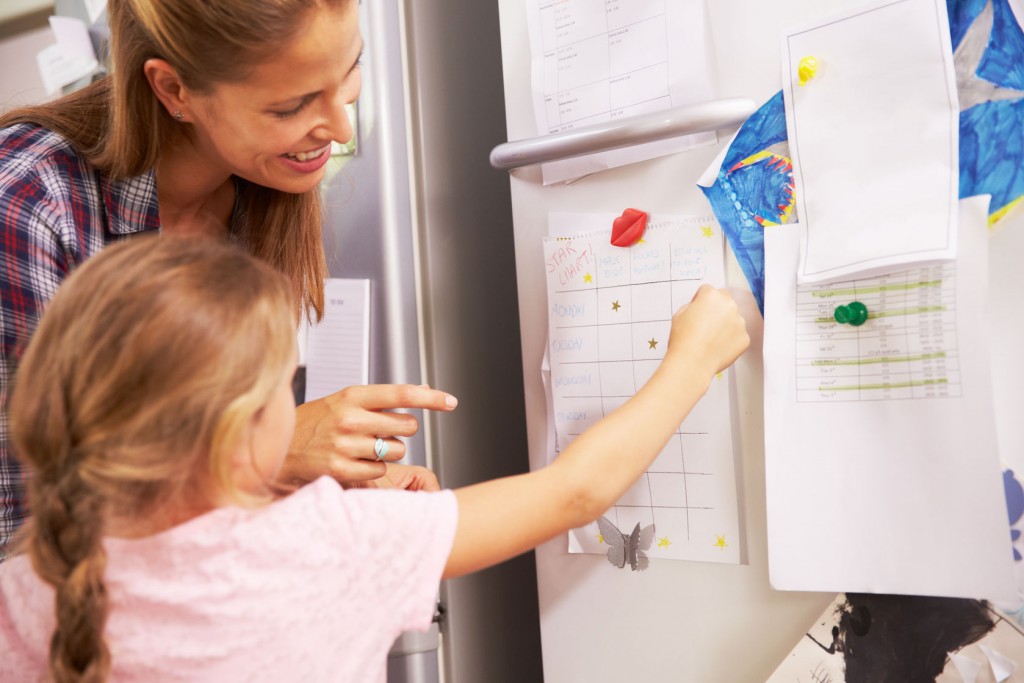As parents, we have multitudes of opportunities every day to give our children direction on their routines. While it may be easier to just do things for them, we do want to build responsibility in them. There is a way to build that responsibility without nagging. What they need is a little bit of motivation. And rewarding good behaviors rather than giving consequences for poor behaviors should be our first plan of attack in training our children.
Think about how we as adults are motivated to work. We all like to think we are motivated with intrinsic rewards—that we derive personal satisfaction from a job well done. That is the best motivator of what we do in life. But it doesn’t usually start that way. Most of us need some extrinsic reward in the beginning. In the job market, it’s our paycheck or commission for the work we do. Both types of rewards are essential.
With children, it takes a long time to build personal gratification for doing something right. Until that time comes, it helps to offer appropriate rewards to motivate them. We can plead with our children all day long, but if they don’t see the personal benefit in the activity being required, training towards a long term habit will be long in coming.
The key is to use rewards to initially train a behavior, and then eventually switch to the intrinsic motivation once the behavior is established as a habit. When we began using external motivators to help our children establish good habits in the beginning, it eliminates nagging and allows us to have more peace in our home.
Keep the following in mind when establishing rewards:
- Rewards should not always be in the form of money. While financial compensation is a universal motivator, we don’t want to teach our children to expect payment for everything they do around the home. Some jobs should be expected simply because every member of a family should share the load. Other behaviors we want to train—like keeping your room clean or brushing your teeth—could receive a star or point which may be cashed in later.
-
Find what motivates each of your children. Not all children are motivated by the same things. While some children enjoy the reward of just spending some special time with Mom and Dad, others would prefer getting some extra time to play games on the computer. Find out what your child likes and would motivate him as he begins to establish the new habit. While preschoolers love pennies, stars, and stickers, we moved to using Bonus Points as they reached the elementary school ages. We found that very helpful in a household of five children. This gave us the option to negotiate with each child the cashing in of those points. Points were sometimes agreed upon and sometimes spontaneous to recognize something above and beyond.
-
Use rewards until the behavior becomes a habit. Extrinsic rewards are great in the training period, but at some point (and by a certain age) the trained behavior should be an expected one. The goal is to switch over to the intrinsic motivators: that I feel better if I keep my room clean rather than having to do a major overhaul on a weekly basis; that this is being a part of my family; that I am helping someone else. As behaviors are trained and rewards are eliminated, new behaviors replace those and begin to earn the reward.
-
Show appreciation at the same time as giving rewards. Even though we are using extrinsic rewards to motivate, we still need to say thank you to them for a job well done. It’s also good to point out how they feel inside when they finish the assignment. Show them that there is personal gratification when they complete it. I like to point out a personality trait that the child demonstrated by what they did. “You did a fabulous job picking up your room! I can see that you are a great organizer!” We can also explain how that trait will be a huge benefit later in life—a skill that is sought after in the workplace as well as a benefit in your own home. This helps our children feel assured that they are valuable members of our family and will be valuable members of society in the future.
Hopefully, as a child matures, he will begin to understand that we do things not just for ourselves, but because it helps others as well as makes us feel good about ourselves. A child who has grown up in a home where this training is in play will learn huge lessons that will help him succeed the rest of his life.
Question: How have you used rewards effectively to train good habits and life skills? Share your answer in the comments below.
